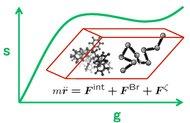
The contents of this course is included in the new master course 4LM30 Multiscale modelling for polymer mechanics.
The course will give an introduction to the most common and important particle-based simulation techniques, namely to
- Molecular Dynamics (MD) simulations;
- Brownian Dynamics (BD) simulations, and Langevin dynamics;
- Metropolis Monte Carlo (MC) simulations,
that are used nowadays to model and predict the thermo-mechanical properties of materials.
To that end, the course will include the following subtopics:
- Controlling the temperature and pressure with thermo- and barostats;
- Imposing external deformation and temperature gradients;
- Calculation of the mechanical and thermal response (stress tensor and heat flux);
- Tools for analysing the microstructure (e.g., heterogeneity, network-connectivity, structure factor).
In order to increase the accuracy and efficiency of the simulations, the course covers also
- Time-integration schemes for MD (Euler, Verlet) and BD (Euler);
- Efficient energy and force calculations for large systems (neighbour lists and cell lists);
- Periodic boundary conditions.
Specifically for the Metropolis MC technique, the following aspects are discussed:
- Importance of designing unphysical moves (in contrast to MD and BD);
- Averages and the usefulness of fluctuations
- Phase transitions.
The above simulation methods will be applied to study the behaviour of molecular fluids, polymers, colloids, and metals.
Learning objectives
After following this course, the student will have proficiency in predicting, by means of computer simulations, the macroscopic thermo-mechanical properties of materials based on the dynamics of the constituent particles (atoms, molecules). To that end, the student will have acquired practical expertise about the most important particle-based simulation techniques, e.g., Molecular Dynamics simulations and Brownian Dynamics simulations, and Monte Carlo simulations, and applied these methods to problems in Mechanical Engineering.